#he is a BLOCK (solid) not a CUBE (vague shape)
Explore tagged Tumblr posts
Text


6. Blocky
#grey (my ver) and a more canonical red ver#i imagine my grey blocky is concrete while cannon is wood#this red alt of my ver could be brick... that could be fun#blocky#blocky bfdi#blocky bfb#bfdi#bfb#also originally he was going to be transparent like a “how to draw a cube!” type thing but then i realized#he is a BLOCK (solid) not a CUBE (vague shape)#so now... he is solid once again#a better name than that#have nots
74 notes
·
View notes
Text
& you say rise above (self-para)
summary: peter meets an old friend in an unexpected place and faces dire consequences word count: 3002 trigger warnings: violence, injury, death mention, spider-man cops (completely useless, but existent)
It was ten seventeen PM. He had been at work late, probably too late, troubleshooting something small and nitpicky that even he barely understood. At least there was always food somewhere in the building, and FRIDAY liked him enough to not yell at him when he stole a second donut, or a third, or when he ordered an extra-large pizza on Tony Stark’s credit card. As long as he didn’t leave his workspace too greasy and saved some leftovers for Tony, he’d probably be fine.
Whatever it was he had been supposed to be working on, clean energy or artificial intelligence or consumer goods or fancy sunglasses, it probably wasn’t supposed to have been reconstructing the lenses of Spider-Man’s mask to better conform to his facial expressions, but Peter had had to do some repairs after Gabby had torn the thing to shreds. If Tony caught him sewing on the clock, what was he going to do? Let Spider-Man go without a mask? Put Peter’s life at risk? No, he’d be fine. He’d been too antsy to focus on real work, his ribs still healing, his face still a little tender. He’d needed a concrete physical distraction and the satisfaction of knowing he was fixing something.
(He’d be totally fine in a day or two; he was almost there, but Gabby had done a pretty solid number on him. Broken ribs, a black eye, scabs where the pavement had rubbed his chin raw, the whole shebang. He told everyone it was a bike accident, even though he didn’t own a bike, because nearly beaten to death by a chemically ramped-up teenager wasn’t something that could realistically have happened to completely normal, non-superhero guy Peter Parker. In retrospect, he should have said he’d crashed his skateboard into a taxi again, which he had done more than once in high school, but hindsight was 20/20.)
Still, the time spent on the mask during the day had meant a pile of unfinished work, which had meant staying at the tower later. Peter knew that, as best as he’d tried not to be, he was a nepotism hire. He’d waltzed into Stark industries with little training and few qualifications, and he was determined to prove that he was just as suited to be here as anyone else. Yeah, he’d had the internship, but he’d gotten that through sheer dumb luck and minor internet fame, and he and Tony both knew it had been a cover, anyway. Yeah, he had a college degree, but most of his actual work experience had been mediocre photography for a vaguely predatory, second-rate newspaper. He’d been a child prodigy, sure, but last he’d checked most child prodigies peaked sometime around high school, and building the Spider-Man suit for personal gain wasn’t about to go on his resume. He knew any interview process he’d gone through had been performative; he knew that the job had been his no matter what, so long as he hadn’t actually blown up the company. He didn’t want Tony to regret his decision, and he really did want to keep his job. That meant actually doing his work, even if he did have to stay long past dark.
So he’d finally finished—the work and the mask—and headed home to find Sandwich demanding a second dinner and a walk. Fine. Okay. He could do that.
“All you’ve got going for you is your body, bud,” he said. “Don’t know why you’re so determined to ruin that.” Sandwich was beautiful, in a scraggly rescue dog kind of way (Aunt May said he looked like the dog from Annie, which was probably a compliment), but he was also dumb as a rock. He put a few treats in the bowl anyway and went to find a leash.
As he dug through the storage cube where he was sure he’d left the good collar, Peter heard sirens. They sounded close, maybe a few blocks away, and getting closer. His police scanner was on his nightstand, but there wasn’t time to check. Sirens were as good a cue as any.
“I’ll be back soon,” he told Sandwich, as he grabbed his suit from the pile on the floor, pulled it on, and headed towards the window. “We’ll walk later. Promise. Please don’t eat the couch again while I’m gone.”
The dog grunted and went back to eating.
&&&
Web swinging was hard today. His body groaned with every movement, resisting the stress of his acrobatics. Still healing. He hadn’t realized she’d gotten him quite that badly; he’d been up against way worse than a single teenage girl, but he hadn’t had anyone try so determinedly to kill him from such close range in a long time--not since Norman, or maybe Harry, but that had felt a little more reluctant. Fine, he’d go easy on the somersaults.
So long as whatever was up there wasn’t a troupe of murderous acrobats, he’d probably be okay. At least the new mask was holding up well.
What was up ahead, three or five or seven or twenty-six blocks from his apartment, he’d lost count, was—lights. Sirens. Yelling. A strange, echoing thump-thump. Shit. He dropped himself onto a rooftop to survey the scene, his ribs only groaning a little bit as he landed in a crouch. A bank, long closed for the night, its windows smashed. A row of police cars, like a barricade. Coming in from the north, fire trucks, an ambulance. A small throng of bystanders, their phones out, edging around the scene. A trail of broken asphalt running away in the opposite direction.
And in the middle of it all, a figure.
A man, maybe. In a long jacket, something more than the night obscuring his face. He—if it was a he—didn’t seem very big, but he hovered several feet above the ground, supported by what appeared to be a pair of giant robotic arms. Another pair spread wide into the night air, lashing at anyone who tried to approach.
Peter was pretty sure he’d seen those arms before, or something very like them. Mostly in sketches, then once or twice in a lab in college, never in use, just propped up safely against the back wall. They help my dexterity, Peter. More precise.
But that had been in a secure research lab up at Columbia, where the arms had helped a man’s clumsy hands study nuclear physics at an atomic scale, not ravage a bank on the Lower East Side. Stolen tech, maybe? A copycat? Convergent evolution, two people independently building the same machine at the same time? But what were the odds of that, really? These were robotic arms, not clean energy or self-driving cars. It was too niche. Who was this man, and what could he want?
He swung down, closer, landing on the hood of a police car. The officer standing next to it looked down at Peter and sighed.
“Hey, Spider-Man,” he said. “You can go home. We’ve got this.”
Peter tethered himself to a lamppost closer to the bank and leapt off the hood, angry at his stupid fragile body keeping him from somersaulting away for maximum dramatic effect. “That’s what you always say, Bill.”
“It’s David.”
“I really don’t care.”
He landed on the lamppost, but just barely. The many-armed man had seen him coming and was getting closer, one of his robotic limbs swiping at Peter’s perch. Peter leaped off before the pole could crash down and rolled to the ground, where he finally got a good look at his assailant.
He hadn’t imagined it. He knew those arms.
“Doctor Oc—"
Doctor Octavius. His thesis advisor. A kind, absentminded, academic type, the brand who left their office littered with sticky notes to remember to buy milk, who replied to emails four days late at two in the morning. He’d called Peter a genius kid, said he’d had what it takes to save the world. Because that’s what scientists do, Peter. We change things. We fix them. We make them better. We help the people who can’t help themselves—you get that, don’t you?
Oh, he got it.
Doc was wearing glasses, and his jovial smile had twisted into a sneer, but it was unmistakably him. He lowered himself to the ground, all four metal arms swirling around him.“Oh, great,” he said. “It’s the bug boy. What, couldn’t send any of the real superheroes to stop me? Daddy too busy arresting innocent people?”
With all due respect, Peter thought, what the fuck? Sure, he wasn’t an Enforcer, but his old professor going on a crime spree with a set of weaponized robot arms, probably having some sort of episode, called for enforcement.
He lifted himself off the ground slowly. His body was already screaming for a break, and they were barely getting started. “Look, dude, I respect the whole eight-legs thing, but you don’t gotta be so literal about it. It’s kinda—what’s the word? Tacky.”
Doc lunged at him; Peter dodged. “Wait, no,” he continued. “Kitschy. Campy. Gaudy.” Another swipe, another dodge. “No, I was right the first time. Tacky, it’s tacky.”
The next swipe came from behind him, and Peter jumped out of the way just in time. “What do you even want, Doc? For a guy in tights to teach you that robbing banks and taking hostages is wrong? Congrats, you got it!” He didn’t know if there were hostages; he’d been too stunned by Otto to check, he just assumed there were. There were almost always hostages when the guys in costumes got involved.
“How do you know my name?” Octavius growled.
Yep, there were hostages.
“I dunno, it was just a vibe. You kind of look like my dentist.” And the man who shaped my college career, but same thing.
Most nights he could go on like this forever. Banter, dodge, punch, jump, repeat. Talk him into submission, until he was too worn down by Peter’s endless punchlines to punch back. Tonight, he was tired. He was injured. He had a dog at home waiting for a walk. This needed to be quick—rescue the hostages, get Otto taken in and looked after. (Kindly, he hoped; the Otto Octavius he knew was a good man, and was probably in there somewhere, scared and confused.) In the morning, maybe Peter Parker could call to innocently, coincidentally check in on his old mentor and get the full story.
“You’re a nuisance, Spider-Man. You know that, don’t you?”
“So it said on my report cards.”
Octavius stepped closer, and Peter webbed one of his metal legs to the ground, but he kept swiping. In his real arms, the human ones, Peter could see a briefcase, presumably full of the stolen money or techno-weapons for looting safety deposit boxes. So he already had what he wanted, but still the hostages, still the rampage, still the crazed look behind those horrible dark goggles. Peter could deal with him, the cops could free the hostages, they’d be fine, this was fine, everything was going to be fine.
But how had this happened—why had this happened? Did he poison everyone he touched? Ben, Gwen, Norman, even Harry, all either dead or driven mad by his proximity. Who next? Tony? May? Steph? MJ? His high school science teacher? His next-door neighbors?
You ruin everything, Peter Parker. They’re safer if you don’t love them, if they don’t love you. You’re a time bomb. A nuclear blast. Look at what you do to them. What you’ve done. You’re not worth it.
His spider sense alerting him to an incoming blow put a pause on the cycle of self-loathing. He couldn’t dodge in time, and an angry fist landed hard against his face. He groaned, and he tasted the blood from his (now probably broken) nose as it dripped into his mouth. “What do you want, Otto?” he spat.
Shit.
“Doctor” he could get away with as a joke, but how would Spider-Man know Doctor Octavius’s first name? He wouldn’t, that’s how. Not unless they knew each other in real life, civilian life, faces uncovered and feet on the ground. Peter, you idiot. His cover, which he had so carefully maintained for the past eight years, was about a minute from being blown by an academic in octopus cosplay.
This shouldn’t have been happening. He was a professional, he was good at this. He had learned from his past, he was doing better, and these were amateur mistakes. He was off his game, that’s what this was. He was exhausted, injured, overworked, stunned by the improbability of it all. His whole life was improbable; he should have known to expect this kind of thing by now, but he wasn’t convinced he wasn’t living out some middle schooler’s sadistic Mad Libs. He still had time to fix this.
Otto said nothing; he just laughed.
Peter tried to launch himself in the air for a swing and a kick, but his reflexes were slowing, his injuries worsening. Whatever healing he’d done had been set back several days, and every movement was more labored than the last. Before he could evade, the arms, all of them now free of webbing, wrapped themselves around him and pulled him in. Peter hissed in response, his exhalation short and shallow, doing his best to suppress a yelp.
“Oh, come on. Personal space, dude,” he said, and the top left arm pinched his wrists together in response. He was now being held fast in evil, sentient handcuffs, no hopes of swinging away in sight. Nothing this stupid would have happened to Tony; Tony would have had lasers and lights and taken out this guy in minutes. Hell, he could have called in the Iron Legion for backup if he’d wanted, but a single man didn’t deserve it. Peter was a disappointment, again. This should have been so easy, and yet.
And yet.
Peter wasn’t Tony Stark.
“Otto,” growled Octavius.
Peter said nothing.
“Why did you call me that?”
This time, Peter squirmed. He was being held tightly, so tightly. His wrists were raw, his chest burning, and at some point, he had started to bleed. Work was going to have to buy bike accident twice this week. ”I told you. You look like my dentist. His name’s Otto. It was a lucky guess.”
“Somehow, I don’t believe you.”
His head spun and his mouth tasted like iron and asphalt as the world tunneled in around the edges of his vision. His hands still tied, he tried to gain some leverage with a kick, but the other arms squeezed even tighter until he was sure he felt a crunch. Great. This was it, this was how he died. Sometime around midnight outside a random bank because his college thesis advisor had taken up a life of crime and he’d been too weak and injured to do anything about it. Yeah, that tracked.
“Who are you, Spider-Man?”
Peter couldn’t speak, couldn’t move, could only steel himself as his spider sense turned on high alert. Imminent danger, big time. Yeah, he got it. With the human hand not holding the briefcase, Otto pulled the mask from his head.
And immediately dropped him, limp and winded and battered, to the ground.
Peter’s bare skin was so cold, the streetlights so bright, every sound and smell heightened without the mask.
Otto’s face had cleared with recognition, and his sneer fell away. “Peter?”
Peter groaned. Then he peeled himself off the ground and launched a flurry of web bombs until Otto was wrapped tightly all over. It wouldn’t hold long, but it would have to hold long enough to get him taken safely into custody. Locked up in the Raft for ten to life, a brilliant man’s work cut short by his own creation. (Was it too soon to make Frankenstein jokes?) But Peter couldn’t think about the tragedy of it yet. He had to keep moving.
He kept his head down until he found the mask by Otto’s feet. His hands were shaking, and it took impossibly long to fit it back over his head. It was twisted or too small or made for someone else entirely, bunching around his neck and pulling uncomfortably against his swollen face. And then he stood up, wobbly and wheezing, and faced the officers who were pulling the hostages from the building. Maybe they’d been inside. Maybe they hadn’t seen him. Maybe it was okay.
“You’ve got this from here, Bill,” he said, and, with every ounce of willpower he had left, he swung away on shaky arms to pick up his dog, call Aunt May, and hide in his childhood bedroom for the rest of his life.
&&&
The officers may not have seen him, but there had been bystanders. There are always bystanders, just like there are always hostages. They have cameras. They have social media. They flock to danger, to drama, to sensationalism. They post suffering for the likes and the retweets and the fleeting moments of fame. A Spider-Man sighting was pretty commonplace--novel, but not extraordinary. But this tableau, a hero in crisis, an identity revealed, that was media gold. This was a millennial icon’s Pyrrhic victory. This was a new weak spot in the Accords. And under all that bravado, he was just a scared little boy. They didn't recognize him (there was at least one audible boo when someone realized that Spider-Man was just another pasty white boy), but they’d seen him, and that was enough.
The responsible thing would have been to keep his secret, to respect the sanctity of what had happened here tonight. But the bystanders are never responsible.
While all the others had been texting and tweeting and snapping and streaming, at least one had had the wherewithal to take a picture with one of their fancy, enormous, three-lensed phone cameras and capture Spider-Man unmasked, clear as day, battered and bloody but distinctly him, and send it straight to the Daily Bugle.
(The ball’s in your court now, Jameson.)
#( self-para )#( & you say rise above )#tw: injury#tw: violence#tw: death mention#( yeah i fucked with my own canon for dramatic effect sue me )
7 notes
·
View notes
Text

for @electricpentacle: 36: “Don’t move, it’ll be okay.”
Spoilers for Picard finale, proceed with caution!!
Hugh strongly disliked regeneration.
He was thankfully past that phase where he had to plug himself into a charger at night. He slept in a bed, like a person, now, and only some of his implants got plugged into anything. Still, blacking out for hours on end, surrendering control of his body to a daily fit of unconsciousness, made him vaguely uncomfortable at the best of times. He much preferred being up and about. So when he woke up with no memory of having gotten horizontal and a sudden, searing, encompassing pain coursing through him as he attempted to move, his mind immediately jumped to the worst conclusion, every xB’s nightmare. Oh shit, they’re scrapping me for parts.
He had to get out of here, wherever here was. He was not restrained. Foolish of them, giving Hugh a chance to escape. He tried to sit up - again the pain - but he had to be more than the pain - it drove tears to his eyes, wrung an animal sound from his throat, somewhere between a cry and a whimper - no time for that now -
Suddenly there was a shape blocking out the light, a silhouette, someone... and hands, hands on Hugh, not hurting, not yet, but restraining, pressing him back down.
Hugh wasn’t a fighter, hated the concept, but... rats, the Romulans called them, him and all the xB. Cornered, a rat would fight. Even though it hurt like a thousand red-hot needles, he brought his arm up to shield himself against the intruder. None of his remaining implants were weaponized (which was a good thing, Hugh barely knew which end of a phaser to point where) but he could kick and scratch and bite and
“Please, calm yourself,” urged a vaguely familiar voice above him. “Please, you’re hurting yourself. Shh. Don’t move, it’ll be okay.”
“You’re going to take me apart!” How was any of this okay?
“Oh... no, my friend, I’d never. I pledged myself to your cause.”
The word friend broke through the daze, that and how sincerely shocked the voice sounded. Hugh blinked, breathed, attempted to assess. His artificial eye was swimmy, only slowly coming back online. He tried to squint the natural one and discern the shape above him. He knew that person.
Ah. A lithe frame, long strands of hair, high cheekbones, the tips of pointed ears, concerned eyes peering down at him from under elegantly slanted eyebrows. Attractive, Hugh’s mind supplied, a useless assessment. Mouthy Romulan.
“Elnor?”
Elnor gave him a shaky smile. “You’re finally awake.”
With his vision clearing as pain ebbed away, Hugh looked from Elnor to his surroundings. He was in his own bed, in his own room. Oh yes, he had a bedroom on a Borg cube now. Living space carved out on a Borg cube, where no organic living was supposed to happen, was by nature sparse, impersonal, and Hugh’s attempts to make the room his own in the past had yielded... mixed results. There was his desk and work station, where he performed impromptu maintenance on his implants, there were pictures on the walls of his friends, (the crew from his original cube, the very first xBs, Geordi at their latest meeting), there was the little rainbow flag that Geordi had gifted him for his last naming day. Little touches of color against the oppressive dark of the walls, but Hugh liked to think he’d managed to impress his personality on the formerly Collective-dominated space.
How had he gotten here? Had Elnor... brought him here? But how would Elnor know where he lived?
Hugh noticed that Elnor was squeezing his hand. Rather tightly, too. “Where... what happened?”
Elnor’s eyes turned wide and distant as he was reliving the memory. “You got stabbed. The Zhat Vash agent...”
“Yes, yes. After.” Hugh remembered being stabbed. Remembered Narissa slaughtering his people, innocents, only just on the cusp of finding back to themselves. All that potential, so many healed and vibrant lives in potentia, snuffed out and tossed away like so much garbage. This was how they perceived his people. This was how they’d always treat his people. How’s that for a lost cause?
“Seven of Nine, she put you in a... she called it an alcove,” Elnor said. “For a while you stood and healed, like the inactive drones we saw. It made me feel a bit uncomfortable. Then she had me take you here. It’s better. You are crying.”
“Seven is here?” Hugh raised a hand - it was weak, it was trembling, he’d lost a lot of blood, apparently he’d brushed up against death - and wiped his eyes. He wanted to get to the bottom of what had transpired here, learn why Seven was here, how many xB had survived, what he could do next, how he could help next - but he also wanted to cry. To mourn those he’d failed to protect in any substantial way. A good cry can work wonders - that was one of the pithy Geordi wisdoms he’d gotten over the years. But he also wanted to move on already, to get back to work.
“How long was I out? What else was going on?”
Elnor cocked his head. The movement caused a strand of his hair to shift from its queue. So long, Hugh’s mind supplied. Nice to put my hands in there, potentially. He dismissed it. Individuality meant untidy thinking, sometimes. Thoughts drifted, got hung up on matters that were irrelevant.
“A lot,” Elnor was saying. “I think Soji almost destroyed the world, but then she reconsidered. The cube is stranded now. Picard was dead, but he’s now recovering. There are no more Zhat Vash here. I’m sorry, I don’t know how many xBs are still alive, but they’re attempting to fix everything here. The Synths over at the settlement have started talking to the Federation...”
“Hold on a moment.” Hugh raised a hand and waved it weakly. “Synths? Dr. Asha almost destroyed the world? They stranded the Artifact? Picard was dead? How did I miss all this?”
Elnor was still holding his other hand. Now he gave it a few pats, seemingly absentminded, not even noticing he was doing it. “You had to heal for a while. Seven says it was to be expected, since you’ve not been Borg for so long. But now you’re awake.” Elnor let out a long, shaky exhale. His shoulders slumped. Whatever had gone on lately, it was evident that Elnor had been through a lot. “Now you’re awake.”
“Hey now,” Hugh murmured, squeezing Elnor’s hand back briefly. The guy liked physical contact, right? Hugh seemed to remember this. He sat up a little - it was already much easier now - and reached out for a one-armed hug.
Elnor reciprocated with enthusiasm, throwing both arms around Hugh and holding on for dear life. It was a tight squeeze, and another burst of pain echoed through Hugh’s body, but it passed, and he appreciated all the rest of it. Elnor was a warm weight pressed against him, solid, grounding, comforting, and he even allowed Hugh to rest his head on his shoulder for a moment. This was a good hug.
Would be nice... him and me like this, Hugh thought. Would be nice to see if he kisses as good as he hugs. Need only move a slight bit... Again, there was very little telling where that had come from. Hugh shook his head and broke away from the immediate contact. Elnor’s arms slipped off him, resting to both sides of him on the bed, still close, still warm, still bracing.
“We should get going on,” Hugh said. “I should talk to Seven, find out what exactly I missed.”
Elnor nodded. “She stayed on the station. I can take you there. The Synths let us come and go as we please now.”
Synths, huh. Hugh flicked his eyes shut for a moment. He had opposed the Synth ban when it had happened, out of principle, even as the phrase Soong-type android was still, even all these years after Lore, liable to give him a tension headache.
“But I feel discomfort,” Elnor continued. Ah, something something absolute candour.
Hugh tried to shift away from him. “Oh, I’m sorry.”
“Not with you,” Elnor clarified. “But today... these previous days have been... so much. And I felt wonder, and joy, and fear, and grief, and I thought you were dead, and we all almost died, and Picard actually died, although he’s doing much better already. And it’s a long walk from here to the station and I’m not sure you can do it yet. And I’d like to... sit, here, if that’s okay. We can still go later, right?”
Hugh raised an eyebrow. “You’d like to... just sit here?”
Elnor nodded. “Please. I like to see... I pledged myself to you, and it’s good to see you alive. I like to look... at you.” This truth came haltingly, with Elnor’s eyes downcast in what seemed like sudden shyness.
Hm, Hugh thought, filing that observation away for later. “Not much to look at here, but sure. We can take a moment.”
Somehow, their hands had enjoined again.
#hugh/elnor#tell me if i need to put a readmore it's almost 6 in the morning and i've lost all sense of perspective#posts by me#they stole an hour from me :( it got me good#i don't remember the word for it... something something clock change summer time
7 notes
·
View notes
Text
songs of the heart
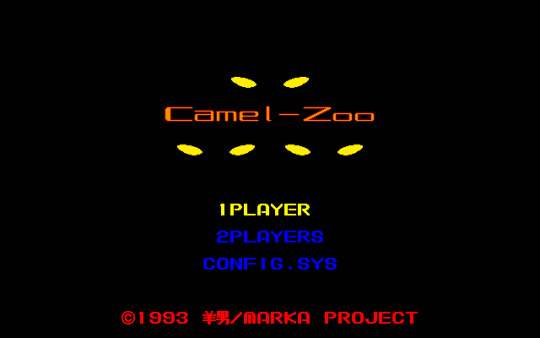
a moving and beautiful metaphor of the imagination is that green lantern can produce almost anything he wants, but generally settles for slightly larger versions of his own hand.
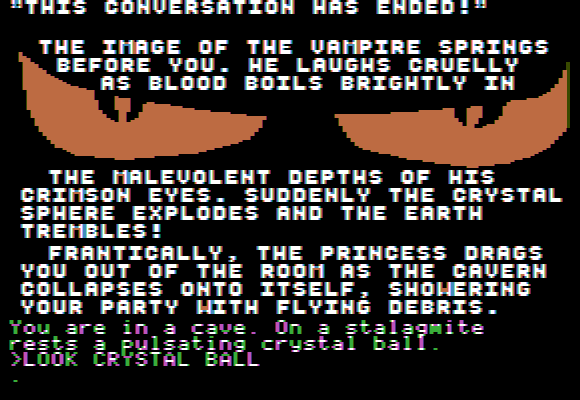
i feel the process of playing games is so diffuse and distracted that you almost have to direct them at the night side of the mind. the process of using computers is so distracted. and the structuring element, programming, jumping on blocks and so forth comes out because it's a way to connect to that distractedness. there's a very lotus-eating quality to rigorous left-brain activity - higher mathematics is the definition of rigor but the history and practice of higher mathematics is also one of mysticism, vagueness, revelation, digression, daydream, renunciation, cults, duels, murder..
the continuing effort to harness the dreamy propulsiveness of a videogame within a more artistic setting never quite work out, it always feels like dragging things into the sunlight ends up losing much more than is gained. we play these things and go yes but if only they had better art, better writing, some sense of theme, some more thoughtful or appropriate structures of interactivity - but then some of them have all those things, and they're never quite satisfying. "game design" remains the norm but as effective as it sometimes is it's something like a cargo cult, the substitution of a means for an end - the denial of an end, in that game design pretends to have value in itself, when any power it has is just the residue of some other process which "gameplay" is the conventionalization and rationalisation of. you see it on the train sometimes, people tapping at nothing on the homepage of their phones, looking at nothing - and then it's like they realise and they open a game so that they can tap at nothing, look at nothing, but with the support net of looking like they have an end in mind.
videogames were invented as a way to justify the fascination of a computer, and the history of videogames is the history of failed attempts to keep up with the development of that fascination. i started making computer games so that i'd have something to tinker with while waiting for limewire downloads to finish, but i downloaded music through limewire partly as an excuse to sit around and do nothing on a computer. later "art" comes in etc - at that moment of disillusionment when it becomes clear that games have nothing to tell us about our own attraction to these devices. now they can be viewed aesthetically, in much the same way that painting and sculpture became aesthetic fields as it became clear they could not keep pace with the demands of religio-mystical impulse. on one hand you have conservative videogames that deny this subterranean fascination exists, to eternally diminishing returns, on the other you have artistic videogames that might theoretically recognise it but still treat it as slightly tasteless, beyond the pale. i think there's this image of the subconscious or the dreamlike as infinitely undirected, free-flowing - a sort of site of leisure as opposed to the productivity of the working day. but the split between leisure and production was itself wishful thinking (or rather mystified thinking, an effort to disguise the way capitalism only rewards certain forms of production by pretending this reflects a sort of metaphysical schism between real-work and not-real-work). and so to an extent is the split between conscious work and unconscious freedom. we daydream at work - most paid labour is useless - and get absorbed in the most banal, nitpicky stuff in our dreams. supermarkets, corridors, rented rooms. obsessively trying to complete tasks, silently arguing, thinking, scheming. trying to work through some material, meaning or affect production.
computers aren't dreams but they can have the same rhythm, in the same clawing and sorting through scraps of the immaterial, like big magpies. this is the face and videogames are the mask. i think it can be hard to look on the face directly, without turning away or substituting in an image of what we'd like to believe constitutes the life of dreams. so what i think is preferable to the attempt would be a sort of dilapidation, a gradual collapse - forms of inattentiveness that allow the real shapes of attention and drive to start pushing through the facade. games for nothing but that renounce even the surly pleasures of being for nothing, a sort of pachinko machine for human consciousness, where the trappings of art and entertainment have dissolved to just whatever mere bony part of them was really being used in guiding that attention. an eye, some crates. river sound. hffhfhh hh hh kk. question mark npc. left. north. not so much the famous cube-based "minimalism" which just consisted of a sort of wishful gentrified version of conservative gamism, more a kind of dilapadism where obsessive focus on rituals of pacing results a side effect in a type of chrysalid-game consisting solely of the parts of gristle our minds don't immediately digest. i imagine it would look something like neo mr. do. neo mr. do review: 99 stars.
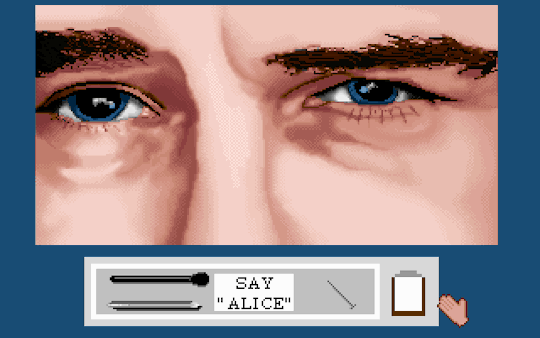
there's that great moment in silent hill 2 where you see the monster standing silently, openly, on the other side of a break in the corridor, and there's a similar moment in myst 3 where you peep through a window and see the live-action hominid antagonist silently pacing around the prerendered terrain muttering to himself. and of course there's the moment in super mario world where you go down a pipe into some large underground cavern and glimpse a grinning, shadowy figure silently hovering around a castle in the distance. there are probably others, i should keep a record, but most of the ones i remember lose some of their aura by having that moment - of glimpsing, of peeking - immediately segue into some cutscene where the pressure to react was comfortably taken away. i've written before about how hard i find it to look at things in videogames, as opposed to immediately dismantling them as just hovering components of some structure underneath. here i looked, or tried to look, because it was hard to do that - because visuality suddenly became very pressing in a way which was not accounted for by the structure, whether mechanically, by pacing, emotional tells, etc. a threatening visuality, visuality as a threat, in thesame way that text in videogames is a threat - the imposition within one system of a completely seperate one, with its own demands and requirements, and where the two can't immediately be reconciled via some hierarchy of attention.
actually the videogame element i probably looked at most as a kid was the top of the toilet guard's head in goldeneye. you're in a vent, above a toilet cubicle, you can see him standing silently in the adjoining cubicle... and of course i gloatingly looked as i considered the best way to kill him. could i attach a mine to his head? could i shoot off his hat without him noticing? well, why deny ourselves the small pleasures in life, ha ha ha. but of course in first person shootersyou tend to "see" with your gun anyway - you examine the models in the snow level by shooting them, like you collect jewellery in resident evil by shooting it with a handgun, just like you do for the collectible frogs in metal gear solid 3... and while there are lots of games that have some kind of free-look mode, binoculars, whatever, i never found them nearly as satisfying to use. it's like removing the ability to reach out and touch what you're looking at, so to speak, robs the image of depth. and there's something threatening about this depthless world. staring through a videogame telescope is claustrophobic since there's no sense of what you're looking at really being there. like samuel johnson the tendency is to mill into things to reassure ourselves that we don't live in some kind of berkeleyan illusory universe. collision boxes and interactive doohickeys in games provide the je ne sais quoi that helps convince us that there is something beyond what we see, but conversely taking those things away can suggest there's nothing beyond what we see, and that what we see has no substance behind it. pure virtual changeability. i think becoming used to the sort of chopped-up montage-o-vision a game entails as a fast way to process information means reading a merely visual image can seem an exhausting longeur, like looking at the unbroken long shots of early cinema after growing up on MTV. and the sudden switch to a visual mode can re-instate something of the terror of the virtual that videogames go to such lengths to circumscribe.
if visuality in videogames is awkward and unendurable than that's obviously more reason to do it. there's a good jake clover game where you rightclick to use telescope and it becomes like the black keys on a piano, the eerie counterpoint to a familiar system. as you walk around and look at things you begin to enjoy the nauseating shift, having the camera suddenly rush towards some blurred and inexplicable object, the sudden dissolution of your immediate sense of grounded spatial awareness... you begin to look at more things, as if you were a connoisseur.....
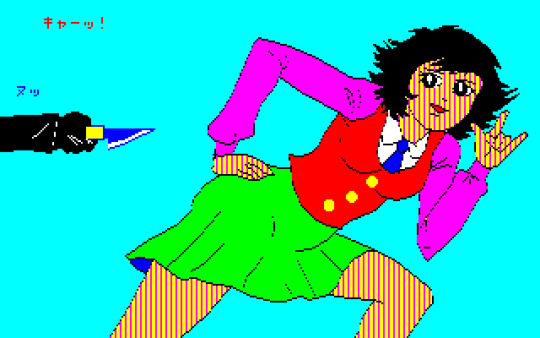
what if the little prince was a freak? he'd be called the little freak. on these thoughts i leave you. adieu............. - stephen
(images: Camel-Zoo, The Crimson Crown, Life Death 2, Mari-Chan Kiki Ippatsu)
17 notes
·
View notes
Text
The Blood Moon, and Liber KKK Conjuration #1
The idea behind Peter Carroll’s Liber KKK (Kaos Keranous Kybernetos, not Ku Klux Klan...) seems to be to give the beginning Chaote some loose structure in what is ostensibly a structureless method of magick.
I’ve decided that it’s as good a curriculum as any to follow, and that the night of the blood moon (here in England, anyway) is as good a night as any to begin.
You can read it in its entirety here, if you fancy picking it up yourself.
To give you a rough idea of what it entails, I’ll just paste this line here:
Liber KKK is a series of twenty-five magical operations or "conjurations". The five classical conjurations of Evocation, Divination, Enchantment, Invocation and Illumination are each performed on the five levels of Sorcery, Shamanic Magic, Ritual Magic, Astral Magic and High Magic. Thus the whole work systematically resumes the entire tradition of magical technique, leading the magician from simple practices and the manufacture of tools towards the mastery of more complex experiments on the psychic level.
Good! So. Conjuration #1 reads thus:
The magician creates with his own hands a physical representation of a fetish entity by carving, moulding or assembly. Its functions are in general to attract success, to protect by repelling misfortune and to act as a reservoir of power for the magician. It is usually shaped to resemble some kind of actual living being or chimerical being whose form suggests its function. If it is vaguely humanoid in shape it is known as a Homunculus. It may be made to contain parts of the magician's body or be annointed with blood or sexual fluids. The magician treats the fetish as a living being, speaking his will to it, commanding it to exert its its influence in his favour and carrying it on his person when on critical errands. Some magicians prefer to make two fetishes, one to implement will, the other to bring knowledge and information.
Now, being English, I’m not great with the word ‘fetish’. Nor am I particularly great with annointing something I’ve made with sexual fluids like it’s an anime sculpture covered in hot glue. So, in the spirit of Chaos Magick, I’ve done some tweaking.
I bought myself a big old batch of polymer clay (y’know the stuff that goes rock solid if you bake it for 20 - 30 minutes?), and set up a clear workspace. Here’s a big block of black clay, ready for molding:
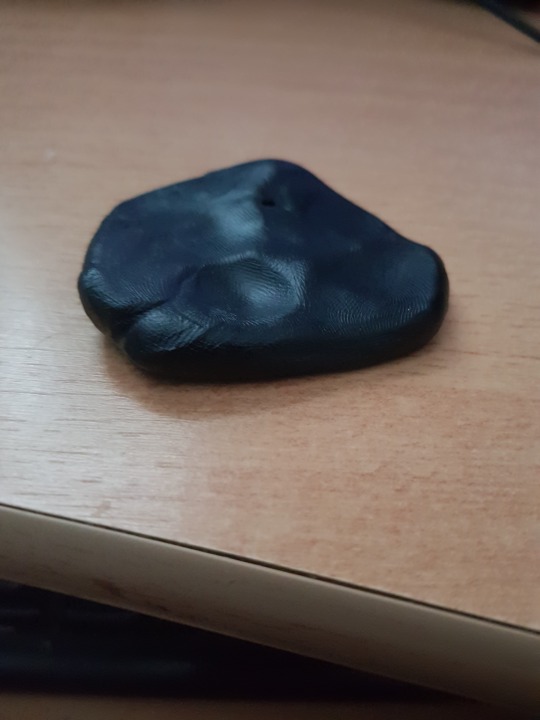
Mmmm. Delicious. Please do resist the urge to eat it.
Now, the Liber KKK mentions annointing with blood or sexual fluids, but I thought “Hmm, what can I do with this that’ll have a similar effect?”. Now obviously, I want to keep the blood, because I’m doing this to coincide with the blood moon. Nice. Quick nip on my finger with a razorblade (safely, and with medical equipment on standby just in case), and the clay is now... soaked in blood. Lovely!
But I don’t feel like that’s enough, so I thought “I know what I’ll do! I’ll make this with my blood, sweat and tears! Literally!”. We’re currently in the middle of a vile, oppressive heat wave in England, so the sweat came about pretty easily (just off my forehead, nothing too disgusting). The tears were a little more challenging - I can’t exactly cry on command.
I stuck my face in front of a high-powered fan (it’s hot, remember?) and put on a playlist of incredibly sad, incredibly emotional songs. Eventually, mercifully, some tears decided to show up and into the goop they go! So now I have... mildly moist black goop. Hmm.
Next, modelling!
I am not a particularly crafts-y sort-of person. I’m not a particularly artsy sort-of person either, so this wasn’t going to be pretty, but I still wanted it to look vaguely like something, so I thought “Hey, cubes are pretty easy to do”. Therefore, wham! Two cubes. Sort-of.
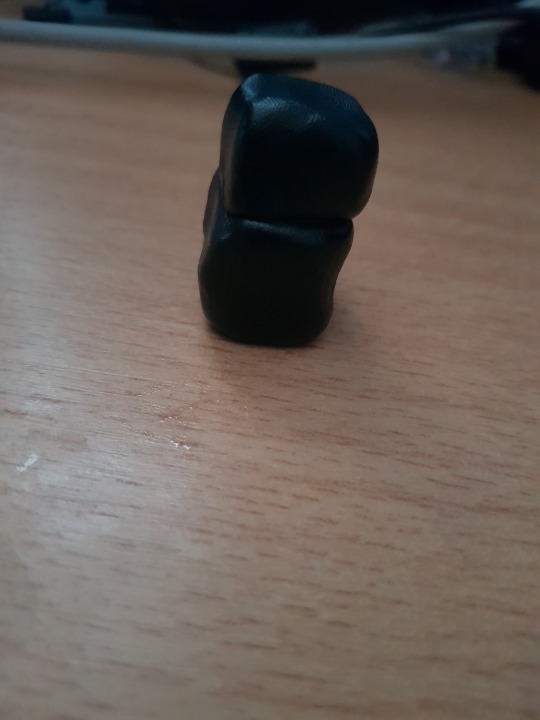
Then I got to thinking “Okay, so this thing’s probably better off being vaguely humanoid, so where can we go from here?” And then it hit me. The ‘fetish’ is meant to have a ‘form that suggests its function’, and ‘exert its influence’ in my favour, essentially at my command. And what’s the best vaguely humanoid thing for doing what it’s told?
Correct! A robot!
So I set about building it into a little robot. Eyes, arms, legs, possibly a mouth. It didn’t really go very well, since I have the sculpting skills of a blind, drunk yak in a pair of too-tight sweatpants. What I ended up with WAS:
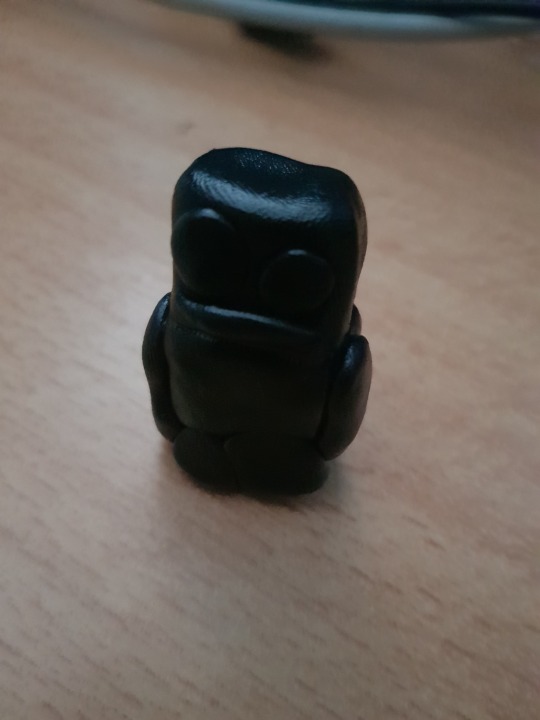
This little dude! (You can’t see it too well, because it’s all black. But trust me, it’s there) He looks sort-of like a piece from the original Jumanji board game, which is fine by me. He also looks sort-of cute, in his own weird, disproportionate way.
So now what? Well, since it’s the night of the Blood Moon, I thought it best to take MAXIMUM advantage of that. NASA has (or had, if you’re reading this in the future) a live YouTube stream of the blood moon, with an overlay mentioning when, in ‘minutes from now’, the Blood Moon would be at its peak (full coverage, I suppose). Now, the clay I made the dude out of needs to be baked for about 20 - 30 minutes at a low temperature in the oven to set and go rock hard, so I timed everything so that he’d just be coming out of the oven as the blood moon reaches its maximum... blood-moonyness, almost as if it’s grown and grown, and then sort-of ‘given birth’ to him. That’s the theory, anyway.
So! Into the oven he goes. Some 20 - 30 minutes-ish later (at exactly 21:21, the height of the Blood Moon’s... thing that it does), out he comes! Looking... about the same!
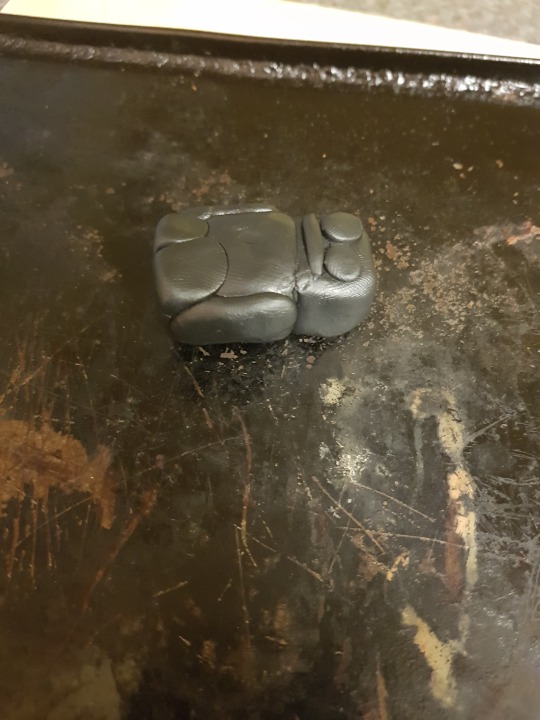
Only thing remaining is to name the cute little dude, and I think this is the part I’m most proud of.
He’s a robot, built partially from blood, (actually literally built from blood, sweat and tears) on the night of a Blood Moon. I have decided to dub him...
HEEMO.
It’s a properly robot-sounding name, while also invoking the prefix ‘haemo-’, meaning blood.
So world, meet Heemo. Heemo, world. Now let’s go conquer it together!
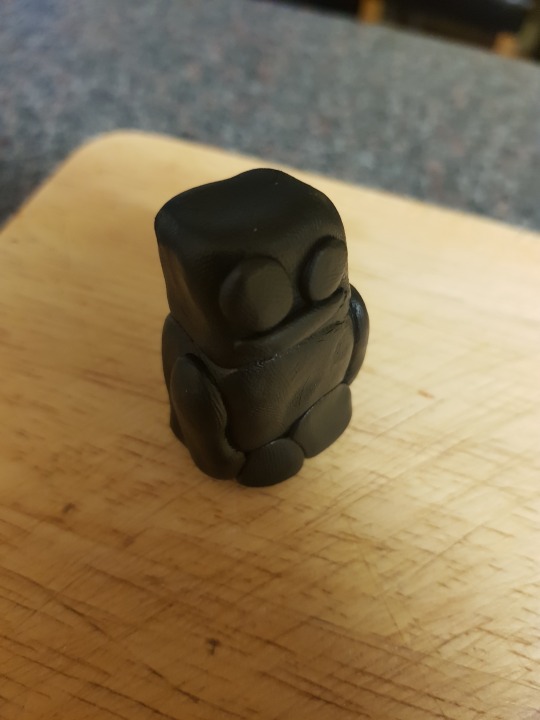
2 notes
·
View notes